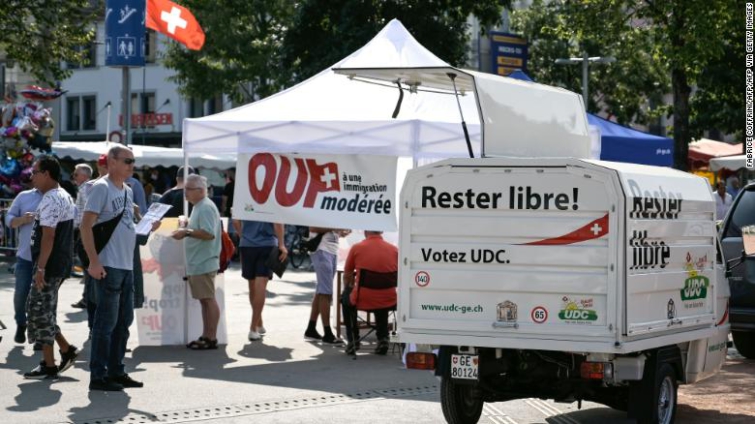Swiss voters overwhelmingly rejected on Sunday a right-wing party's attempt to scrap a pact allowing the free movement of people from the European Union, opting for stability amid the economic uncertainty caused by the coronavirus pandemic.
The Swiss People's Party (SVP) had forced a binding referendum on the EU agreement in a bid to curb immigration to the country where foreigners make up a quarter of the population.
The measure lost by 62%-38% margin. The SVP - the biggest party in parliament - has long pushed to take back control of immigration, echoing some arguments pro-Brexit politicians used in the run-up to Britain's exit from the EU.
It won a referendum on the issue in 2014, only to see parliament water down its implementation.
Opponents said the plan would have robbed business of skilled workers and torpedoed accords that enhance non-EU member Switzerland's access to the crucial EU single market.
Under Switzerland's system of direct democracy, the referendum could have forced the government to annul the EU agreement if negotiations did not produce a deal on ending the pact voluntarily, something Brussels has ruled out.
A "guillotine clause" meant that ending free movement would have toppled other bilateral pacts on land and air transport, procurement, technical barriers to trade, and research.
Around two-thirds of the 2.1 million foreigners living in Switzerland in 2019 were citizens of the EU, as well as Iceland, Norway and Liechtenstein, which with Switzerland are members of the European Free Trade Association (EFTA).
More than 450,000 Swiss live in the EU.
The domestic political battle immediately turned to Switzerland's biggest foreign policy headache: a stalled treaty meant to cement ties with the EU but which critics say infringes too much on Swiss sovereignty and would never win a referendum.
The treaty would have Bern routinely adopt single market rules and create a new platform to resolve disputes.
With questions open over state aid, rules to protect high Swiss wages, and access to welfare benefits, the Swiss have dragged their feet while trying to forge a domestic consensus, triggering a row over cross-border stock trading.
Amid relatively high turnout, voters narrowly blocked an attempt to make it easier to shoot wolves deemed a threat to livestock.
In an unexpectedly close vote, they approved the government's plans to buy new fighter jets for up to 6 billion Swiss francs ($6.46 billion).
Latest Stories
-
Can Mandela’s former negotiator charm Donald Trump?
19 minutes -
UN court backs E Guinea in Gabon dispute over islands in oil-rich waters
31 minutes -
Tanzania president warns ‘meddling’ Kenyan activists
44 minutes -
Nigeria’s fierce political rivals share joke at pope’s inaugural mass
56 minutes -
World-first gonorrhoea vaccine launched by NHS England as infections soar
1 hour -
EU plans €2 fee on small parcels in hit to Shein and Temu
1 hour -
Doubts over whether Brits can use EU e-gates this summer
2 hours -
Trump pressures Republicans to back his ‘big beautiful’ tax bill
2 hours -
Zelensky accuses Russia of ‘buying time’ to stall truce talks
2 hours -
Man who helped smuggle more than 3,000 people into Europe jailed
2 hours -
Jennifer Lopez sued in copyright case for posting photos of herself
2 hours -
US congresswoman charged with assault outside immigration centre
3 hours -
Court orders mental evaluation for extradited Togolese robbery suspect
3 hours -
Police destroy 120 changfang machines at Wassa Gyapa
4 hours -
‘Order from above’ keeps traders on the streets – Dr Oduro Osae
5 hours

